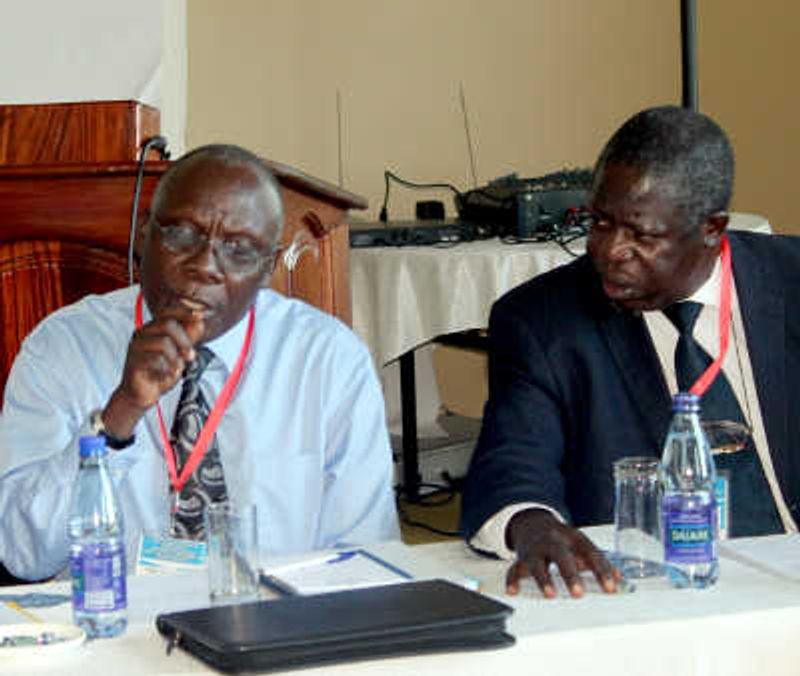

LEFT: Ndejje’s Vice Chancellor Prof. Lugujjo with Prof. Asubo discuss EAC regulations on Education
During a regional two-day validation workshop in Entebbe which closed early this week, education stakeholders from Uganda, Kenya, Tanzania, Rwanda and Burundi deliberated on the draft East African Qualifications Framework for Higher Education (EAQFHE), the outcome of which will lead to mutual recognition of academic and professional qualifications across the EAC.
In his keynote address, the executive secretary of the Inter-University Council for East Africa, Mr Mayunga Nkunya said that the qualifications framework will serve as a convergence platform for harmonisation of qualifications levels and types, entry, articulation and exit pathways for the qualifications level and types in the Community.
Mr Nkunya also said that the Regional Qualifications Framework is designed to expand opportunities for mobility between countries, institutions and education levels as well as serving as a common reference for better understanding of achievements, comparability of qualifications, skills development and employability of graduates
“Qualifications frameworks are regarded as all-encompassing tools for, among others, harmonisation of education and training systems and the qualifications attained. They are also used to guide systematisation of workforce development. Therefore, in developing the regional qualifications framework for higher education for East Africa, IUCEA considered it important to engage a large cross-section of higher education and qualifications stakeholders in the development process. Furthermore, IUCEA decided to carry out a study on the qualifications gaps in the Partner States versus human resources needs,” said the IUCEA boss.
The coming into force of the East African Community (EAC) Common Market Protocol in July 2010 prompted the urgent need to develop tools and systems that would facilitate its operationalisation. In the case of higher education, there was need to develop tools for the operationalisation of Article 11 of the Protocol, which among others, focuses on mutual recognition of academic and professional qualifications. To this, in 2012, IUCEA in collaboration with the National Commissions/Councils for Higher Education of the EAC Partner States initiated the process to develop a regional qualifications framework for higher education in East Africa as one of the important tools for harmonisation of higher education systems in the region.
The East African Community has aspired to transform East Africa into a common higher education space by 2015, as one of the targets for operationalisation of Article 11 of the Common Market.
According to Mr Nkunya,IUCEA has commenced the process of developing a higher education quality rating/ranking system, which is aimed at providing incentives for promoting competitiveness and quality improvement in the core functions of higher education institutions in response to stakeholders’ expectations by informing the stakeholders about the relative quality of education and products offered by the institutions in the region.
Prof Asubo-Apuda, the executive director of Uganda’s National Council for Higher Education reiterated thatto develop East Africa as a common higher education area, there is need for development of a creative economy based on knowledge and innovation, expanded higher education access and equity, Institutionalising quality assurance and standards, supporting dynamic and productive youth by developing programmes for new skills and jobs.
Prof Eliabu Lugujjo, the vice chancellor of Ndejje University,who was among the experts from Uganda, argued that there is need for employers and industry players to outline the basic competencies required of graduates to make it easier for the universities, tertiary institutions and awarding bodies to design programmes and modules in respect to the job market.














Sunrise Admin
Leave a Comment
Your email address will not be published.